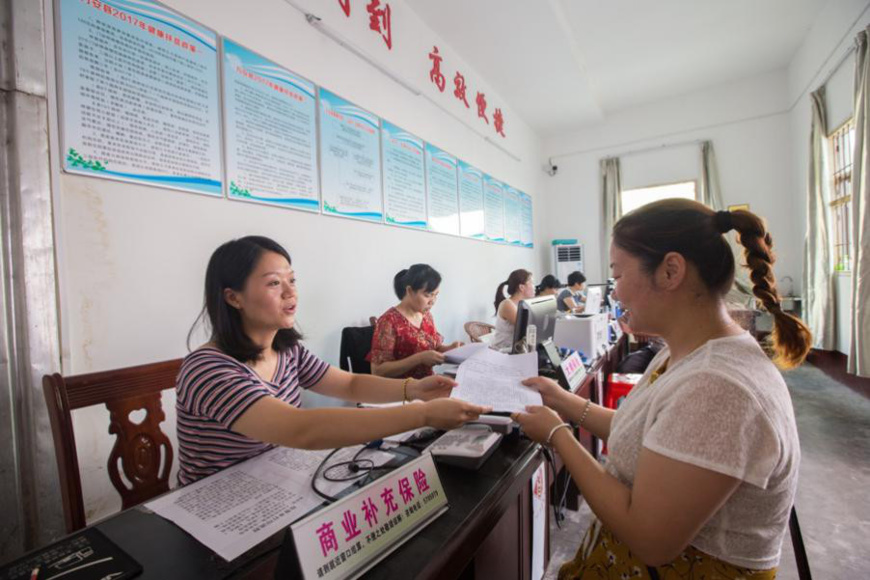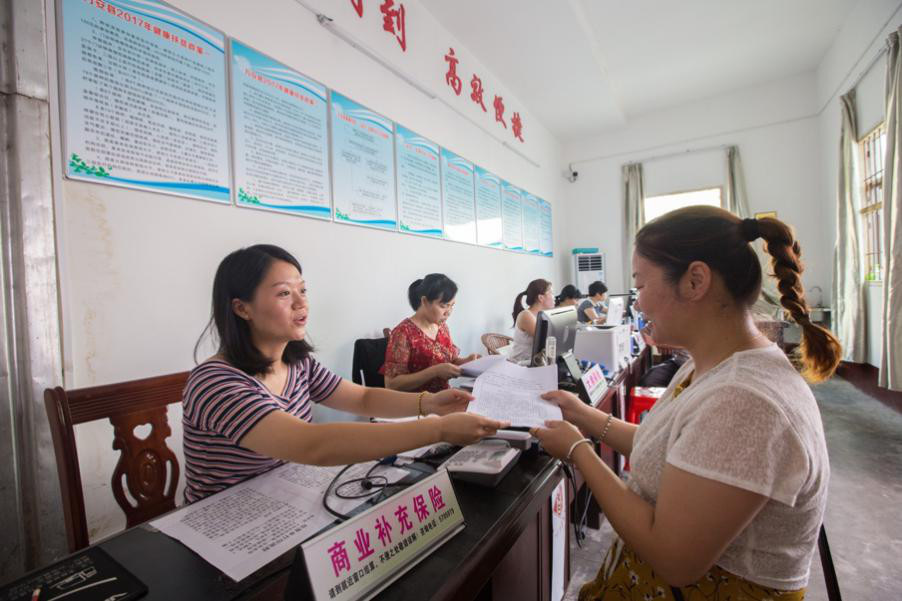By Qu Pei from People’s Daily

An employee working with the “one-stop” health care settlement center in Wan’an county, Jiangxi Province is handling the settlement procedures for impoverished household, August 7, 2017. (Photo by People’s Daily Online)
China will improve the national health policy, and ensure the delivery of comprehensive lifecycle health services for its people, President Xi Jinping vowed when delivering a report to the 19th National Congress of the Communist Party of China (CPC) on Wednesday. His remarks came as the country has set up the world’s largest medical insurance network reaching over 1.3 billion people.
Pledging that China will carry on its “Healthy China initiative”, Xi also stressed that the country will establish distinctively Chinese systems for providing basic healthcare, medical insurance, and quality and efficient healthcare services.
China has woven the world’s largest network of basic medical insurance accessible for all and formed a healthcare service system encompassing both urban and rural areas, said a white paper issued recently by State Council Information Office on development of China's public health.
By the end of 2016, the basic medical insurance has reached over 1.3 billion citizens nationwide, accounting for more than 95 percent of the total population.
In addition, the urban and rural residents now have more equal access to the medical insurance after the country launched the reform in 2016 to create a unified basic health insurance system by integrating basic medical insurance for urban employees and the new rural cooperative medical scheme.
The serious disease insurance scheme was also accessible for all as of 2015 after a pilot trial was launched in 2012. By the end of September 2016, Chinese government had spent 18.9 billion yuan (about $2.9 billion) on medical assistance to 51.45 million residents.
China’s serious disease insurance scheme was recognized by The Lancet, the world's leading independent general medical journal, which said in its commentary that China can provide important enlightenment for other developing nations in addressing the poverty caused by diseases.
A hierarchical medical treatment system was also rolled out to direct resources to grassroots health institutions.
In 2016, 200 Chinese cities that piloted public hospital reform introduced family doctor service contracts, with priorities given to seniors, pregnant women, children and the disabled.
Data showed 22 percent of the entire population in the targeted cities, including 38.8 percent of the priority groups, has been able to enjoy contractual services from family doctors.
A trans-provincial medical treatment settlement system has also been built, allowing any patient enrolled in the public medical insurance system to be reimbursed for inpatient expenses, no matter where they are treated.
The World Health Organization (WHO), in recognition of China’s achievements in health care reform, commented that the reform will lead China’s health care system towards the right direction.
The World Bank also described China's achievement in extending health insurance to 1.3 billion people as “unparalleled” accomplishments.
Pledging that China will carry on its “Healthy China initiative”, Xi also stressed that the country will establish distinctively Chinese systems for providing basic healthcare, medical insurance, and quality and efficient healthcare services.
China has woven the world’s largest network of basic medical insurance accessible for all and formed a healthcare service system encompassing both urban and rural areas, said a white paper issued recently by State Council Information Office on development of China's public health.
By the end of 2016, the basic medical insurance has reached over 1.3 billion citizens nationwide, accounting for more than 95 percent of the total population.
In addition, the urban and rural residents now have more equal access to the medical insurance after the country launched the reform in 2016 to create a unified basic health insurance system by integrating basic medical insurance for urban employees and the new rural cooperative medical scheme.
The serious disease insurance scheme was also accessible for all as of 2015 after a pilot trial was launched in 2012. By the end of September 2016, Chinese government had spent 18.9 billion yuan (about $2.9 billion) on medical assistance to 51.45 million residents.
China’s serious disease insurance scheme was recognized by The Lancet, the world's leading independent general medical journal, which said in its commentary that China can provide important enlightenment for other developing nations in addressing the poverty caused by diseases.
A hierarchical medical treatment system was also rolled out to direct resources to grassroots health institutions.
In 2016, 200 Chinese cities that piloted public hospital reform introduced family doctor service contracts, with priorities given to seniors, pregnant women, children and the disabled.
Data showed 22 percent of the entire population in the targeted cities, including 38.8 percent of the priority groups, has been able to enjoy contractual services from family doctors.
A trans-provincial medical treatment settlement system has also been built, allowing any patient enrolled in the public medical insurance system to be reimbursed for inpatient expenses, no matter where they are treated.
The World Health Organization (WHO), in recognition of China’s achievements in health care reform, commented that the reform will lead China’s health care system towards the right direction.
The World Bank also described China's achievement in extending health insurance to 1.3 billion people as “unparalleled” accomplishments.
 Menu
Menu
 China establishes world’s largest medical insurance network
China establishes world’s largest medical insurance network
















